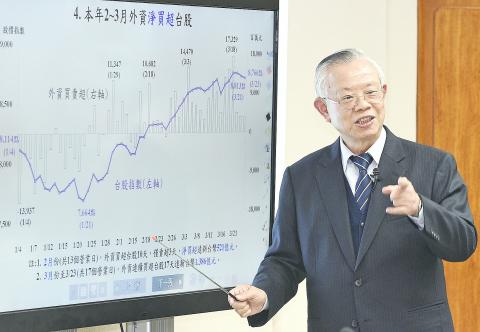The central bank yesterday cut its policy rates by 12.5 basis points and removed all credit controls on housing transactions, except for luxury homes, as the economy continued to deteriorate and housing transactions fell to a 14-year low.
The rate cut, the third since September last year, came after the economy slipped into a recession, with GDP contracting for the past two quarters, and looked set to remain in negative territory this quarter and beyond.
“A rate cut is favorable to maintaining financial stability and boosting confidence when exports fare poorer than expected amid global headwinds,” central bank Governor Perng Fai-nan (彭淮南) told a news conference after the bank’s quarterly board meeting.

Photo: Chen Chih-chu, Taipei Times
The central bank lowered the rediscount rate to 1.5 percent, the collateralized loan rate to 1.875 percent and the unsecured loan rate to 3.75 percent.
However, monetary policy alone cannot turn the economy around, and the public and private sectors should join forces in directing the nation’s excess savings to private investments, Perng said.
The Australia and New Zealand Banking Group (ANZ) said the latest rate cut could discourage capital inflows that have muted the New Taiwan dollar’s fall this year.
“The central bank is wary of capital inflows due to the monetary easing by peers in Europe and Japan,” Hong Kong-based ANZ economist Raymond Yeung (楊宇霆) said in a note.
Perng said he saw no need to keep various mortgage restrictions introduced since June 2010 because they have achieved their purpose of curbing property speculation.
The central bank had subjected houses in Taipei and 15 popular areas of New Taipei City to a mortgage ceiling of 60 percent due to their soaring prices in recent years. The restriction had also extended to multiple home owners and corporate buyers nationwide.
“Housing prices have corrected across the nation, with transactions last year plunging to the lowest level since the technology bubble burst in 2002,” Perng said.
However, the central bank is keeping the 60 percent cap for houses valued at NT$70 million (US$21.39 million) or more in Taipei, NT$60 million in New Taipei City and NT$40 million elsewhere, citing loan overconcentration among lenders.
“Internal data suggest a continued need for credit controls on luxury housings despite a sluggish market,” Perng said.
Luxury housing, especially in the capital, has borne the brunt of tightening measures, particularly a sharp increase in house taxes.
Sinyi Realty Inc (信義房屋), the nation’s only listed real-estate broker, said the loosened credit controls might introduce a healthy dose of confidence to the market without reviving property fever.
“The [central bank’s] sends a message, that the government is suspending policies that are unfavorable to the market,” Sinyi researcher Tseng Chin-der (曾敬德) said, adding that “sentiment should turn from negative to neutral.”
The central bank also scrapped a loan ceiling of 65 percent for land deals.

Conflict with Taiwan could leave China with “massive economic disruption, catastrophic military losses, significant social unrest, and devastating sanctions,” a US think tank said in a report released on Monday. The German Marshall Fund released a report titled If China Attacks Taiwan: The Consequences for China of “Minor Conflict” and “Major War” Scenarios. The report details the “massive” economic, military, social and international costs to China in the event of a minor conflict or major war with Taiwan, estimating that the Chinese People’s Liberation Army (PLA) could sustain losses of more than half of its active-duty ground forces, including 100,000 troops. Understanding Chinese

The Ministry of Foreign Affairs (MOFA) yesterday said it is closely monitoring developments in Venezuela, and would continue to cooperate with democratic allies and work together for regional and global security, stability, and prosperity. The remarks came after the US on Saturday launched a series of airstrikes in Venezuela and kidnapped Venezuelan President Nicolas Maduro, who was later flown to New York along with his wife. The pair face US charges related to drug trafficking and alleged cooperation with gangs designated as terrorist organizations. Maduro has denied the allegations. The ministry said that it is closely monitoring the political and economic situation

UNRELENTING: China attempted cyberattacks on Taiwan’s critical infrastructure 2.63 million times per day last year, up from 1.23 million in 2023, the NSB said China’s cyberarmy has long engaged in cyberattacks against Taiwan’s critical infrastructure, employing diverse and evolving tactics, the National Security Bureau (NSB) said yesterday, adding that cyberattacks on critical energy infrastructure last year increased 10-fold compared with the previous year. The NSB yesterday released a report titled Analysis on China’s Cyber Threats to Taiwan’s Critical Infrastructure in 2025, outlining the number of cyberattacks, major tactics and hacker groups. Taiwan’s national intelligence community identified a large number of cybersecurity incidents last year, the bureau said in a statement. China’s cyberarmy last year launched an average of 2.63 million intrusion attempts per day targeting Taiwan’s critical

AGING: As of last month, people aged 65 or older accounted for 20.06 percent of the total population and the number of couples who got married fell by 18,685 from 2024 Taiwan has surpassed South Korea as the country least willing to have children, with an annual crude birthrate of 4.62 per 1,000 people, Ministry of the Interior data showed yesterday. The nation was previously ranked the second-lowest country in terms of total fertility rate, or the average number of children a woman has in her lifetime. However, South Korea’s fertility rate began to recover from 2023, with total fertility rate rising from 0.72 and estimated to reach 0.82 to 0.85 by last year, and the crude birthrate projected at 6.7 per 1,000 people. Japan’s crude birthrate was projected to fall below six,